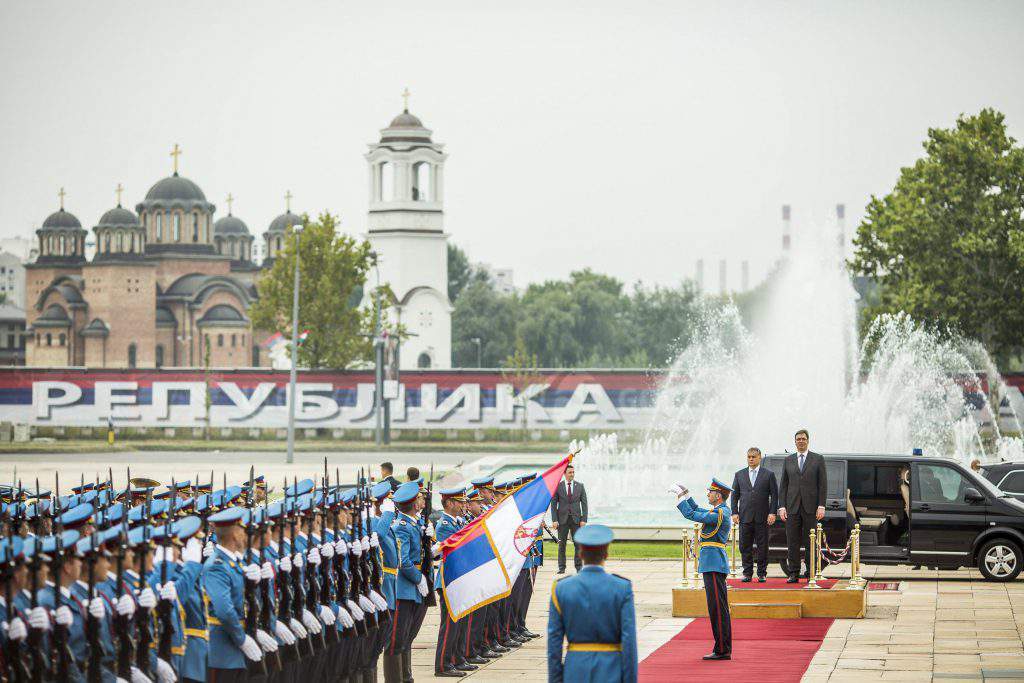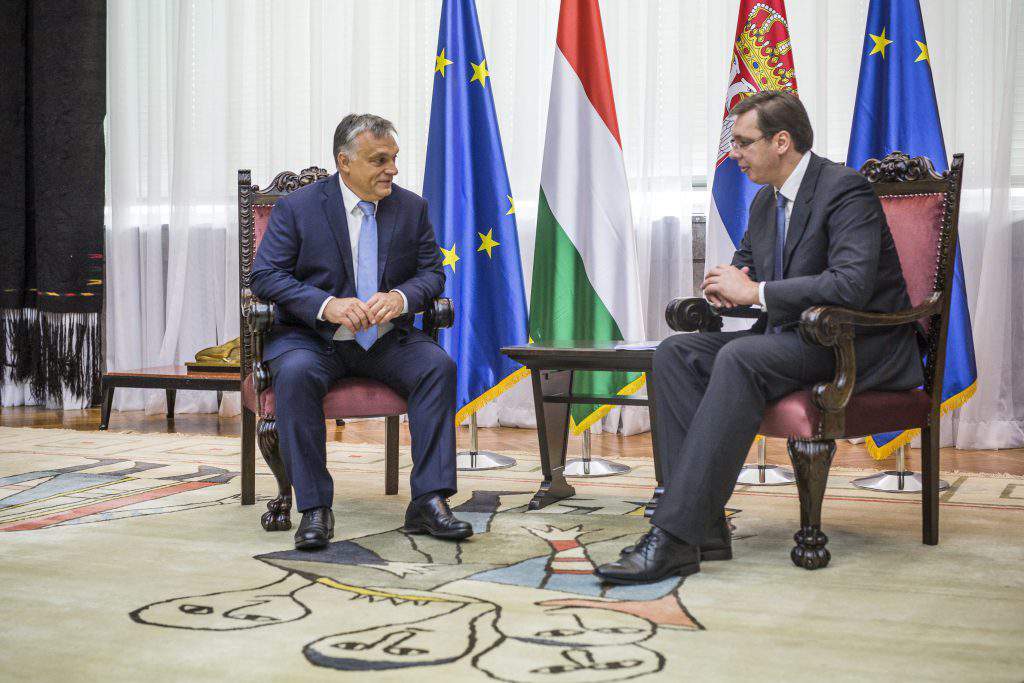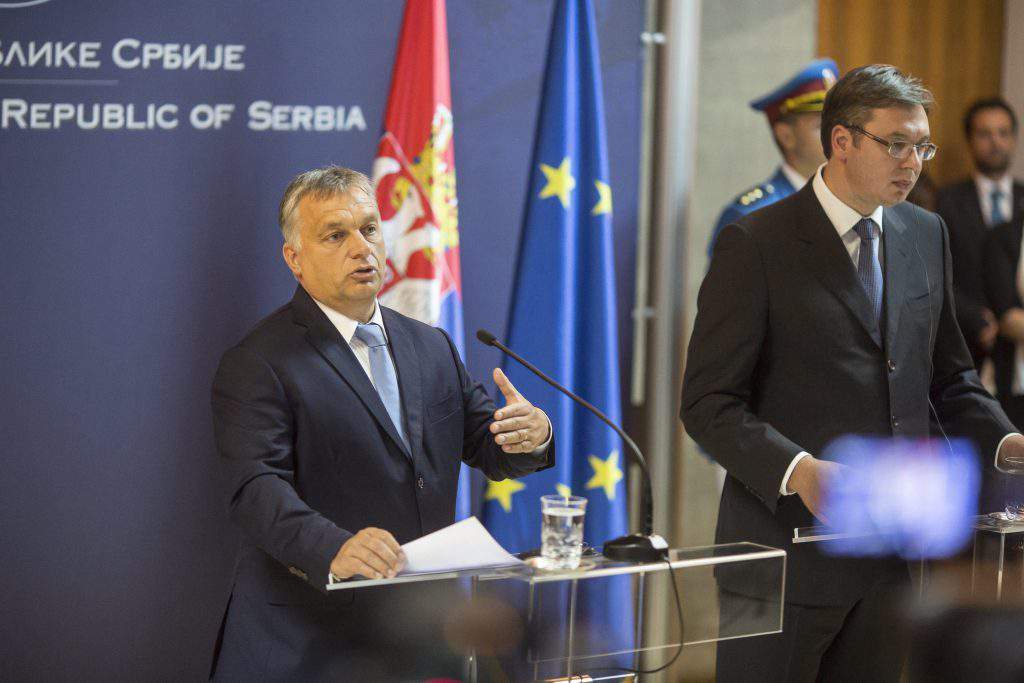Change language:
Orbán met his Serbian counterpart Vucic in Belgrade – UPDATE

Belgrade, September 5 (MTI) – Challenges stemming from a wave of migration similar to those seen last year along the so-called Balkan route could well arise again this autumn, Prime Minister Viktor Orbán said on Monday.
Orbán met his Serbian counterpart Alexandar Vucic in Belgrade on Monday to discuss cooperation in connection with the so-called Balkan migration route.
“We must prepare for a difficult autumn,” he said, adding that the agreement between the European Union and Turkey is fragile, which could lead to a situation similar to that last year.
Orbán told a joint press conference that Hungary wants to “protect what it has achieved so far” and will not tolerate law violations. This includes attempts to enter the country illegally, he said.
Hungary has an interest in helping Serbia so “not a single person can enter Serbia’s territory illegally,” Orbán said, adding that this would fortify Hungary’s security, too.

Orbán said security of Hungarians should not come at the expense of Serbia.
“We are not interested in protecting Hungary’s borders while seeing tens of thousands of migrants stuck in Serbia,” he said.
The prime ministers agreed to open border crossings in order to help the flow of legal movements between their countries.
On the subject of the Oct. 2 referendum in Hungary, Orbán said the vote was needed to address the growing conflicts expected between Hungary and Brussels over migration issues. “Brussels wants to force rules on member states which are against their interests, and if this does not change it will lead to a prolonged political and legal dispute,” Orbán said. “The stronger support we get in the referendum, the better the chances we’ll win this battle against Brussels,” he said.
Addressing the issue of Serbia’s EU accession, Orbán said Serbia should try to get “as close to the EU as possible”. Whereas some are “trying to block this, Hungary does not agree with them,” he said. “Only merit counts.”
Hungarians living in Serbia enjoy “fair and generous” treatment from the government and the Hungarian government aims to be generous to the Serbian community in Hungary, too, Orbán said.
He asked Vucic for his support for Hungary’s bid to organise the 2024 Olympic Summer Games. The whole central and eastern European region would benefit, he added.

Vucic said Hungarian-Serbian relations are outstanding despite the fact that there is no full agreement on all subjects between their countries. Preparations must be made for the autumn and winter, as already 5,000 migrants are in Serbia. Joint working groups are already working on solutions for the upcoming period, he said.
Budapest is contributing towards efforts on the Macedonian border, and this will be extended to the Bulgarian border as well, he noted. Serbia had aimed to show solidarity towards migrants, he said. In the beginning, the main arrivals were families from war-torn regions but now 81 percent of entrants are from Afghanistan and “they are economic migrants,” Vucic said. The EU is helping to cover the enormous costs of providing food and shelter for migrants but Serbia is also having to spend large amounts on this.
Maintaining good relations with Hungary is key for the Serbian government. Mixed committees overseeing the economy, agriculture and tourism will be set up to help improve the exchange of experiences, he said.
Bilateral trade between Hungary and Serbia rose by 12.7 percent in the first half of 2016, thanks mainly to Hungarian investments, Vucic said. A joint government session will be held before the end of the year and the meeting may be held in central Serbia instead of Belgrade in order to help boost Hungarian investments there.

Vucic thanked Orbán for Hungary’s support for Serbia’s EU integration and highlighted that Belgrade wants to make Hungarians living in Serbia feel the same respect that members of the mainstream community receive.
UPDATE
Serbian foreign minister to visit Hungary in October
Ivica Dacic, Serbia’s foreign minister, is scheduled to visit Budapest in October, the Hungarian foreign ministry said in a statement.
The announcement was made on the sidelines of talks between Hungarian Foreign Minister Péter Szijjártó and his Serbian counterpart in Belgrade on Monday.
Parties at the talks also agreed to speed up cross-border road development and strengthen cooperation in energy projects.
Szijjártó is a member of the Hungarian delegation headed by Prime Minister Viktor Orbán.
Photo: MTI
Source: MTI







